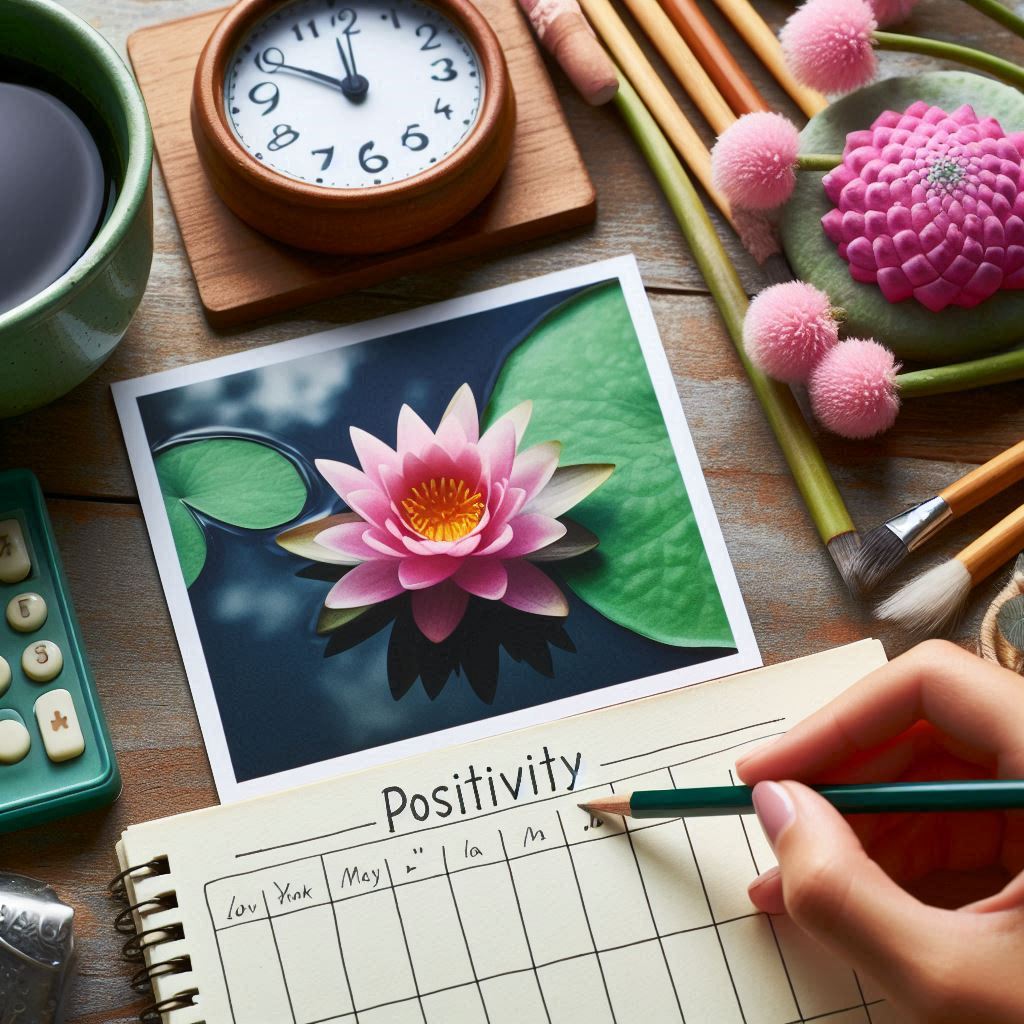Practical Steps to Enhance Your Emotional Well-being
The journey to emotional well-being isn't about quick fixes or eliminating all negative feelings. Instead, it's about developing a more balanced emotional life and building the capacity to work with all of your emotions in constructive ways. Here are science-backed strategies that blend spiritual wisdom with practical application:
Prioritize Self-Care
Self-care isn't selfish—it's essential maintenance for your emotional well-being. When you neglect your basic needs, it's much harder to regulate emotions effectively.
- Mindfulness and Meditation: Research shows regular practice:
- Reduces activity in the amygdala (the brain's alarm system)
- Increases gray matter in areas associated with emotional regulation
- Improves attention to emotional states, allowing earlier intervention
- Physical Activity: Exercise releases endorphins and other neurotransmitters that:
- Boost mood and energy levels
- Reduce symptoms of anxiety and depression
- Improve sleep quality, which further supports emotional regulation
- Healthy Diet: What you eat directly impacts your brain chemistry:
- Foods rich in omega-3 fatty acids support brain health
- Complex carbohydrates help regulate serotonin production
- Minimizing sugar and processed foods reduces mood swings
- Sufficient Sleep: Sleep is crucial for emotional processing:
- During REM sleep, the brain processes emotional experiences
- Sleep deprivation heightens emotional reactivity
- Consistent sleep schedules help stabilize mood
Self-Care Research
A study published in the Journal of Positive Psychology found that people who engaged in daily self-care practices reported 30% higher levels of emotional well-being and showed greater resilience during stressful events.
"Self-care is not a luxury—it's the foundation upon which emotional well-being is built. When we honor our basic needs, we create the conditions for emotional balance to flourish."
Build Strong Relationships
Humans are inherently social beings, and our emotional well-being is deeply connected to the quality of our relationships. Research consistently shows that meaningful social connections are one of the strongest predictors of happiness and life satisfaction.
- Connect with Loved Ones: Spending quality time with supportive people:
- Activates the brain's reward system and releases oxytocin (the "bonding hormone")
- Creates a buffer against stress and anxiety
- Provides opportunities for emotional processing through sharing
- Practice Active Listening: Truly hearing and understanding others:
- Deepens connection and builds trust
- Improves empathy and emotional intelligence
- Reduces misunderstandings and conflict
- Offer Support: Helping others benefits your own well-being:
- Activates the brain's pleasure centers
- Creates a sense of meaning and purpose
- Builds positive reciprocal relationships
Connection Matters
The Harvard Study of Adult Development, one of the longest-running studies on happiness, found that close relationships were the strongest predictor of both happiness and physical health—more important than wealth, fame, or social class.
Develop Coping Mechanisms
Life inevitably brings challenges, and having effective ways to cope with difficulty is essential for emotional well-being. The goal isn't to eliminate stress but to develop healthier responses to it.
- Identify Stressors: Recognizing what triggers negative emotions:
- Allows for proactive rather than reactive responses
- Helps identify patterns that may need addressing
- Creates space between trigger and response
- Healthy Coping Strategies: Techniques like journaling, deep breathing, or creative activities:
- Provide emotional outlets and processing
- Activate the parasympathetic nervous system (rest and digest response)
- Build emotional literacy and self-awareness
- Seek Professional Help: Working with a qualified therapist or counselor:
- Provides expert guidance for complex emotional challenges
- Offers evidence-based tools for specific issues
- Creates a safe space for exploring difficult emotions
Cultivate Gratitude
Gratitude is one of the most well-researched positive psychology interventions. Regular gratitude practice has been shown to significantly impact emotional well-being.
- Focus on the Positive: Appreciating the good things in your life:
- Counteracts the brain's negativity bias (our tendency to focus on threats and problems)
- Increases positive emotions like joy, love, and contentment
- Builds resilience by creating a reservoir of positive experiences to draw upon
- Gratitude Journaling: Regularly writing down what you're thankful for:
- Creates lasting neural changes that support a more positive outlook
- Improves sleep quality when done before bed
- Reduces symptoms of depression and anxiety
Gratitude's Impact
Research from UC Davis found that people who practiced gratitude consistently reported 25% higher levels of happiness, were more likely to have helped someone with a personal problem, and exercised 1.5 hours more per week than those who didn't practice gratitude.
Set Realistic Goals
Having meaningful goals contributes significantly to emotional well-being by providing direction, purpose, and a sense of accomplishment. However, the way you approach goals matters.
- Break Down Large Goals: Dividing ambitious aims into smaller steps:
- Reduces overwhelm and procrastination
- Creates more frequent experiences of success and progress
- Allows for adjustments and learning along the way
- Celebrate Achievements: Acknowledging progress, no matter how small:
- Releases dopamine, reinforcing positive behavior
- Builds confidence and self-efficacy
- Sustains motivation for continued effort
"Progress, not perfection, is what creates sustainable growth and emotional well-being. Each small step forward builds momentum and confidence for the journey ahead."
Practice Self-Compassion
Self-compassion—treating yourself with the same kindness you would offer a good friend—is strongly associated with emotional resilience and well-being.
- Be Kind to Yourself: Approaching yourself with understanding and forgiveness:
- Reduces cortisol (stress hormone) levels
- Improves emotional regulation during difficult experiences
- Increases motivation for self-improvement
- Challenge Negative Thoughts: Replacing self-criticism with self-compassion:
- Interrupts destructive rumination cycles
- Creates healthier narratives about yourself and your experiences
- Improves problem-solving abilities
Self-Compassion Research
Studies by Dr. Kristin Neff have found that self-compassion is more strongly associated with consistent emotional well-being than self-esteem and is linked to less anxiety, depression, and fear of failure.
Explore Your Passions
Engaging in activities that bring you joy and fulfillment is not a luxury—it's an essential component of emotional well-being. These activities create opportunities for flow states, self-expression, and personal growth.
- Discover Your Interests: Engaging in activities you enjoy:
- Activates the brain's reward system
- Creates opportunities for flow states (complete absorption in an optimally challenging activity)
- Provides a healthy escape from stress and worry
- Pursue Hobbies: Finding outlets for creativity and expression:
- Builds skills and confidence in non-work domains
- Creates a sense of identity beyond professional roles
- Fosters community with others who share similar interests
"When we engage in activities that light us up, we not only experience joy in the moment but also build emotional resources that sustain us during challenging times."
Additional Tips for Emotional Well-being
Limit Screen Time
Excessive screen use, particularly social media, has been linked to increased anxiety, depression, and loneliness. Set boundaries around technology use, especially before bed and first thing in the morning. Consider regular digital detoxes to reset your relationship with technology.
Spend Time in Nature
Research shows that even brief exposure to natural environments reduces stress hormones, improves mood, and enhances attention. Try to spend at least 20 minutes in nature several times per week, whether it's a local park, garden, or wilderness area.
Learn to Say No
Setting healthy boundaries is essential for emotional well-being. Practice declining requests that drain your energy or violate your values. Remember that saying no to what doesn't serve you creates space to say yes to what matters most.
Seek Support
No one should navigate emotional challenges alone. Whether through friends, family, support groups, or professional help, reaching out when needed is a sign of strength, not weakness. Different situations may call for different types of support.
The Ongoing Journey
Remember, emotional well-being is a journey, not a destination. Small steps can make a big difference. Be patient with yourself, celebrate your progress along the way, and know that like any worthwhile endeavor, developing emotional well-being takes time and consistent practice.
At Positive 4 Mind, we believe that emotional well-being is intimately connected with spiritual growth. As you develop greater emotional awareness and resilience, you'll find that your spiritual practices deepen, and as your spiritual connection strengthens, your emotional life becomes more balanced and fulfilling.
We invite you to explore our other resources on mindfulness, meditation, and spirituality to support your journey toward holistic well-being.
Recommended Resources for Emotional Well-being
Explore these carefully selected resources to support your emotional well-being journey:
Positive 4 Mind Recommended Resources (External)
Online Courses and Programs
- Unlock Infinite Potential with Mahatria: A Revolutionary Path to Achieving Your Boldest Goals & Awakening Your Soul
- Elevate your well-being and health: rest, heal, and discover
Books
- Positive 4 Mind: Browse our recommended Spirituality Books
- Becoming Supernatural: A WALL STREET JOURNAL BESTSELLER by DR. JOE DISPENZA
- Somehow:Thoughts on Love by Anne Lamott
- Karma: A Yogi's Guide to Creating Your Own Destiny by Sadhguru
- The Joy of the In-Between: 100 Devotions for Trusting God in Your Waiting Season by Ashley Hetherington
Apps
- Mindvalley: Offers guided meditations, breathing exercises, and sleep sounds.
- Higher Mind App: What if your phone, instead of being a reason for continuous distraction and procrastination, became a tool of motivation, focus, and self-discipline?

